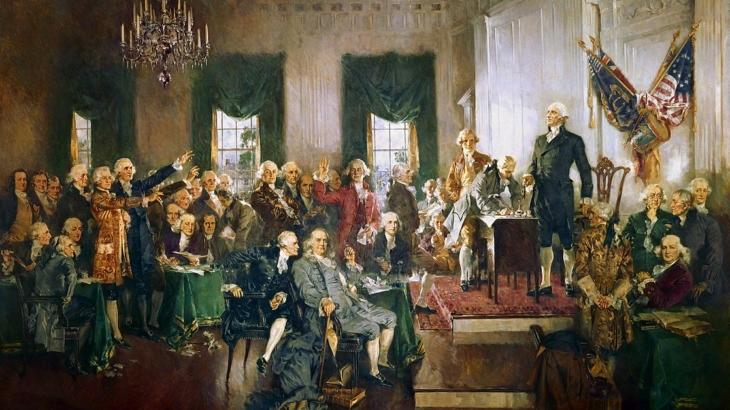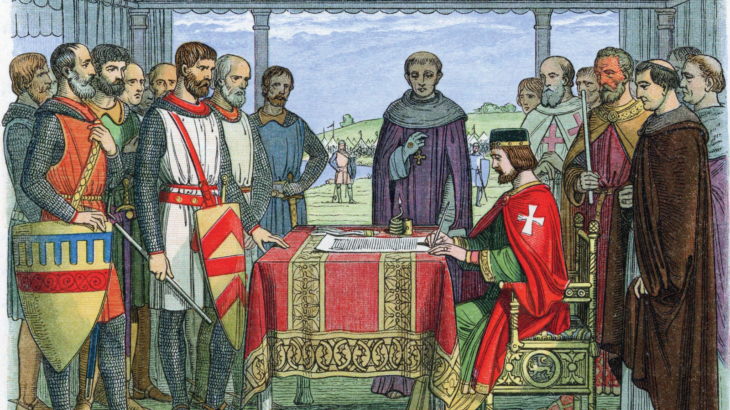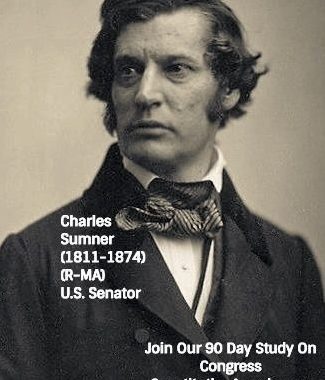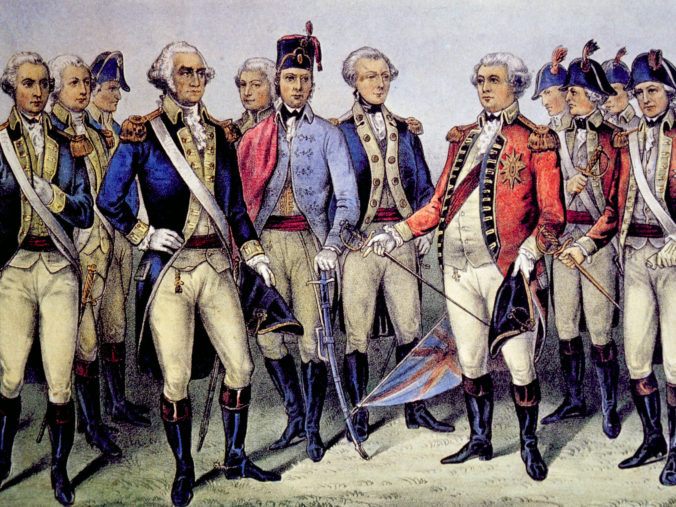
Essay Read By Constituting America Founder, Actress Janine Turner
“…there must be Associations of Men of unshaken Fortitude. A general Dissolution of Principles & Manners will more surely overthrow the Liberties of America than the whole Force of the Common Enemy.” – Samuel Adams, in a letter to James Warren, Philadelphia, February 12, 1779.
The Bill of Rights doesn’t grant or create rights, but it does outline and protect rights. Our nation’s Founders believed that rights were given to us by our Creator. But they also believed that the proper role of government was to protect God-given rights. The freedom of association is a fundamental right of a free people. The First Amendment lays out the basis for the freedom of association — which simply means we have the right to associate with like-minded people, if we choose to.
The First Amendment explicitly protects religious freedom, freedom of speech and of the press, the right to assemble peacefully, and to petition the government to remedy injustice. While the phrase “freedom of association” does not appear in the United States Constitution, the right is wrapped up in the ideas of freedom of speech, the right to peacefully assemble, and the right to petition our government as well as the Due Process Clause of the Fourteenth Amendment.
It is important to remember that the Bill of Rights was never intended to list every God-given right that we have. The Ninth Amendment explicitly states this point — “The enumeration in the Constitution, of certain rights, shall not be construed to deny or disparage others retained by the people.”
Likewise, in some ways the Bill of Rights is more a list of limits on the power of government than it is a list of rights. For example, the First Amendment states “Congress shall make no law ….” The Second Amendment says that the right of the people “shall not be infringed.” The Fourth Amendment says that “the right of the people … shall not be violated….” The Eighth Amendment prohibits government from imposing cruel and unusual punishments and excessive bail and fines.
If the Bill of Rights had been intended by our Founders to be a complete and comprehensive list of every God-given right that we had, it would have been much, much longer. The issues raised in the Bill of Rights were things that the Founders had experience with. They had seen the British crown mandate religious practices, limit speech, destroy presses that published disfavored ideas, and try to confiscate American guns. They had also seen Redcoats terrorize Americans, searching and destroying their homes and businesses without due process. They had also seen throughout history a number of abuses by other overbearing and unjust governments. So the Bill of Rights was only a partial listing of the rights that history had taught them were most likely to be abridged by a tyrannical government.
America’s Founders did speak specifically of the freedom of association. Samuel Adams was an ardent patriot, an influential leader of the movement for American Independence, and a cousin of John Adams. In a letter dated February 12, 1779, to James Warren — a fellow advocate for American independence and a Major General in George Washington’s Continental Army — Sam Adams wrote “…there must be Associations of Men of unshaken Fortitude. A general Dissolution of Principles and Manners will more surely overthrow the Liberties of America than the whole Force of the Common Enemy.”
It makes perfect sense that America’s Founders would see the freedom of association as foundational to a free society. They had gathered together and worked together to promote American independence. And the British Crown had attempted to make those associations a criminal activity. America’s Founders understood that they would have to associate and work with other Americans who shared their desire for independence. The British attempt to deny them the right to associate with like-minded Americans was simply an attempt to silence them and prevent them from petitioning the government for redress of their grievances. And only after years of presenting their grievances and being entirely rebuffed did they finally decide to declare their independence.
A logical extension of the rights of free speech and the right to peacefully assemble is the freedom of association. So while the actual words “freedom of association” do not appear in our Bill of Rights, the principle of freedom of association is clearly intended by our Founders and the United States Constitution. If you only have the freedom of speech as an individual, but cannot align yourself with others who share your views, that would give government the power to limit your ability to effectively speak your mind or petition the government.
Likewise, freedom of association includes the right for a group or association to establish its own rules for governing the internal affairs of the group. Imagine if government could regulate political parties or issues-based groups and how they operate. If government had this power it could effectively stifle a political group’s ability to petition the government or to speak out on policies that it supports or opposes.
Freedom of association also includes the freedom to not associate. An example of unwanted association is when a group tries to force employees to contribute to spending on ideological or political issues that employees may disagree with. The point is that government should not be requiring people to associate or preventing them from associating. In a free society, people get to decide what groups they agree with and which ones they disagree with and to either associate or not to associate based on their own determination — not government mandates.
We have a wide variety of possible associations — family, friends, neighbors, schools, the workplace, clubs, political parties, issue-based groups, etc. Not all are voluntary — for example, we are typically born into a family, we don’t choose the family we belong to. But once we become adults, we do choose how closely we want to align with and associate with our family. Likewise, young children don’t really choose to attend school or even a particular class.
But by the time we are adults, our associations are by choice — the church we go to or don’t go to, the job that we choose to pursue, and the clubs or organizations that we join or support. In a free society, government ought not be dictating what friendships, memberships, or groups we must maintain or support, and alternatively those which we must avoid or spurn. And government should not impose rules upon groups which discourage membership or punish those who align with the group.
In 1958, in NAACP v. Alabama, the Supreme Court unanimously held that the freedom to associate was part and parcel of free speech and peaceable assembly and that it also flowed from the Due Process Clause of the Fourteenth Amendment. The case involved the State of Alabama trying to deny the NAACP the right to operate within the state unless the organization fully disclosed its membership and donor lists.
The NAACP was concerned that such disclosure could be used to harass its members and would significantly limit its ability to align with Americans who supported civil rights and equal rights for all citizens. The U.S. Supreme Court unanimously held that the freedom to associate was part of the ability to engage in free speech and to peacefully assemble and that advancing your beliefs through association with like-minded people was an inseparable part of the Bill of Rights and the Due Process Clause of the Fourteenth Amendment.
Freedom of association is part of American life since the nation’s earliest days. We even associate with other Americans via social media. It is instructive that totalitarian regimes like North Korea, China and Iran outlaw free association. If you’re spotted visiting or dining with the wrong people, these regimes will punish you. If you attend religious services, or have friends who attend such services or have friends who are known to support reforms, you will be punished.
Even China’s social credit program is designed to enforce a mechanism that requires its populace to maintain only those relationships that are approved of by the government. No free society can tolerate a government that believes it has the power or authority to dictate associations in this fashion.
America’s Founders wisely understood that a free people must have the right to think for themselves, to speak freely, to petition their government without reprisals, to create associations to further their beliefs and leverage their speech, and to work individually or in association with others for policy reforms. The nation of America has been blessed that its Founders recognized this important fundamental right of freedom of association.
If America hopes to continue to be a free people, then we must continue to embrace and defend free speech, freedom of the press, freedom of conscience, the right to petition the government and the freedom of association. These freedoms are foundational elements of self-determination.
 George Landrith is the President of Frontiers of Freedom.
George Landrith is the President of Frontiers of Freedom.
Click here for First Principles of the American Founding 90-Day Study Schedule.
Click here to receive our Daily 90-Day Study Essay emailed directly to your inbox.


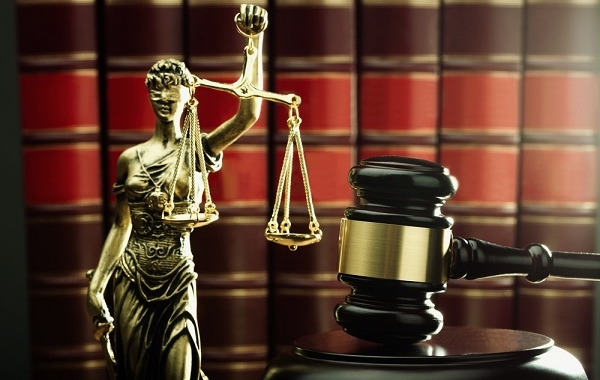
 Essay Read by Constituting America Founder, Actress Janine Turner
Essay Read by Constituting America Founder, Actress Janine Turner